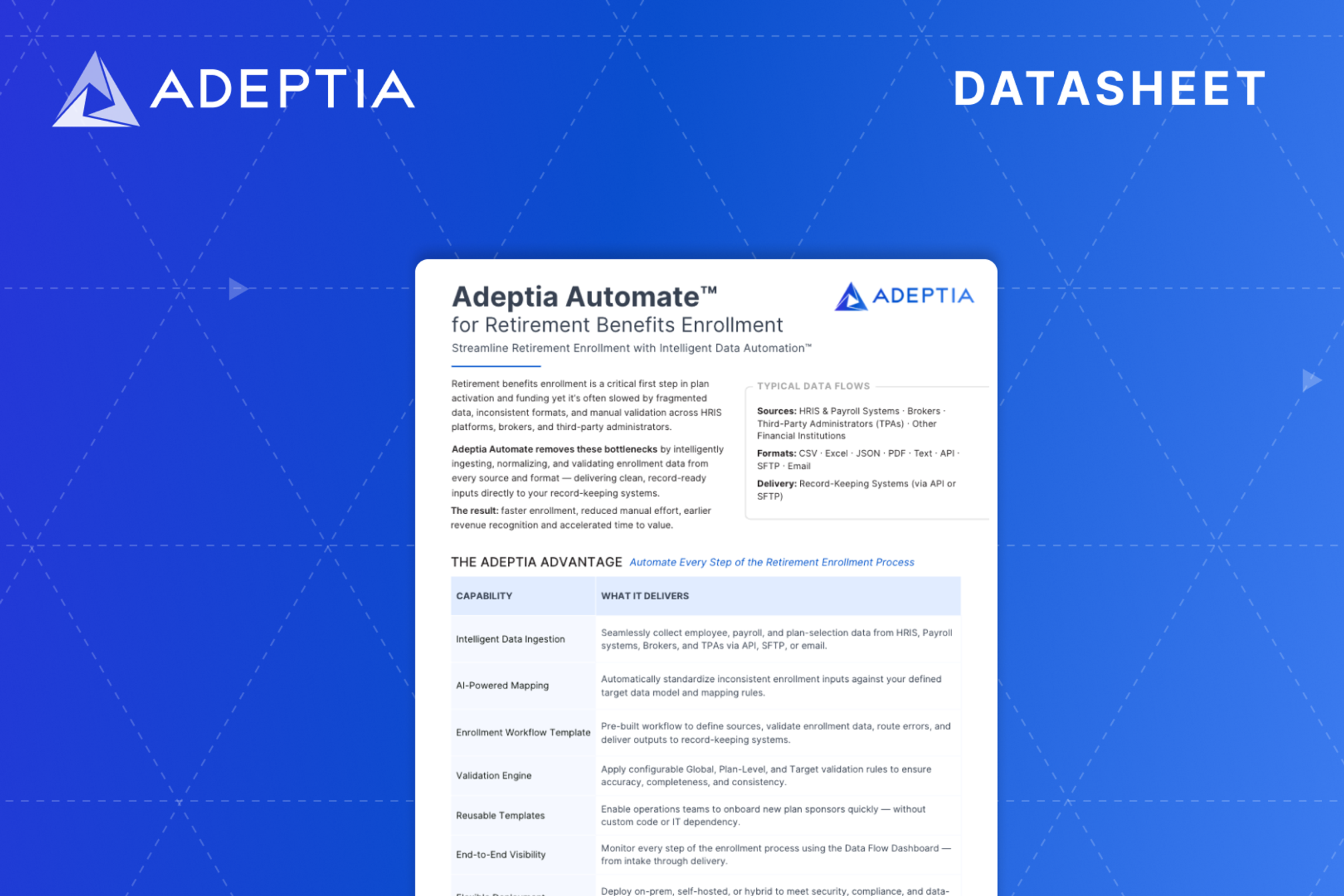Transform Provider and Client Relationships with AI
Better understand client data to expedite patient outcomes and securely automate claim processing.
Automate Better Healthcare Outcomes
Adeptia’s intelligent data automation platform enables modern carrier connections for seamless enrollment, improved customer experience and faster, more efficient data integration.

Cut Claim Onboarding Backlogs by 80%
Avoid delays by automating HIPAA compliant data exchange between providers, patients, and payers with a no-code solution.
- Challenge
Traditional claim processing takes significant IT resources and back and forth communication that causes processing delays. Building bespoke integrations with client systems delays the processing of patient claims, impacting time to revenue and limiting scalability.
- Solution
Adeptia’s no-code solution is designed for business users to automate data entry using AI data mapping from different sources and formats. Adeptia’s platform learns over time to distill insights and identify patterns for continuous integration optimization that empowers healthcare stakeholders. Adeptia’s APIs and pre-built connectors connect with provider and client systems for seamless data exchange. Build integrations once and add to your template library to apply thousands of times over using our drag-and-drop interface for faster connections – no coding required.
Modernize your EDI Data Exchange
Collaborate with providers, health insurers, pharmacies, and employers to securely automate critical patient data exchange, even from unstructured sources.
- Challenge
HIPAA compliance and data security are paramount when it comes to healthcare. Organizations need a solution that not only is secure, but reliably handles thousands of healthcare transactions. The amount of transaction data can be overwhelming and manual entry is an outdated option. The increased chances of errors and delays in providing proper care due to slow data exchange are too great.
- Solution
Adeptia can facilitate secure EDI transactions for automated, accurate data exchange into structured formats that fully support healthcare standards. Adeptia’s AI-powered data mapping identifies patterns that automates the creation of data maps translating diverse data formats into a consistent, unified format. Extract critical insights into your BI tools with our APIs to deliver optimal outcomes faster.
Identify and Correct Claim Errors before Processing
Streamline your operations by empowering business users to optimize data workflows and proactively identify errors before sending claims to payers.
- Challenge
Many solutions place the burden on developers and IT teams to build custom integrations with their partners. After implementation, it’s often up to those teams to maintain these complex integrations and flag any issues that do occur. This manual process causes considerable delays when setting up payments and is not agile nor scalable. When issues do occur, the significant IT backlog creates a reactive rather than proactive system, exacerbating delays and lengthening time to revenue.
- Solution
Create a scalable process by leveraging Adeptia’s no-code solution, designed for business users to automate data exchanges. AI business rules get better over time to automatically map clients’ claim data and map to back-office systems to automate accurate billing. Dashboard within Adeptia designed for closed-loop observability, providing real-time visibility into data flows throughout the entire data exchange process. Issues are quickly identified with real-time alerts and routed to IT teams for fast remediation, with little to no impact on revenues.
Resources
Related Resources

Adeptia Unveils New Accelerator Pack for Retirement Benefits Enrollment, Transforming Disconnected Enrollment Data into Validated, Record-Ready Inputs
Adeptia announces the release of Adeptia Automate for Retirement Benefits Enrollment...

The Hidden Cost of Delayed Asset Onboarding in Retirement Benefit Services
Delayed retirement plan onboarding costs providers $40K+ monthly in deferred revenue. Learn how Intelligent Data Automation cuts transition times by 80%....

Quick Guide to Our Retirement Benefits Enrollment Accelerator
Automate retirement enrollment data from any source. Reduce processing from weeks to hours with AI-powered mapping and validation....